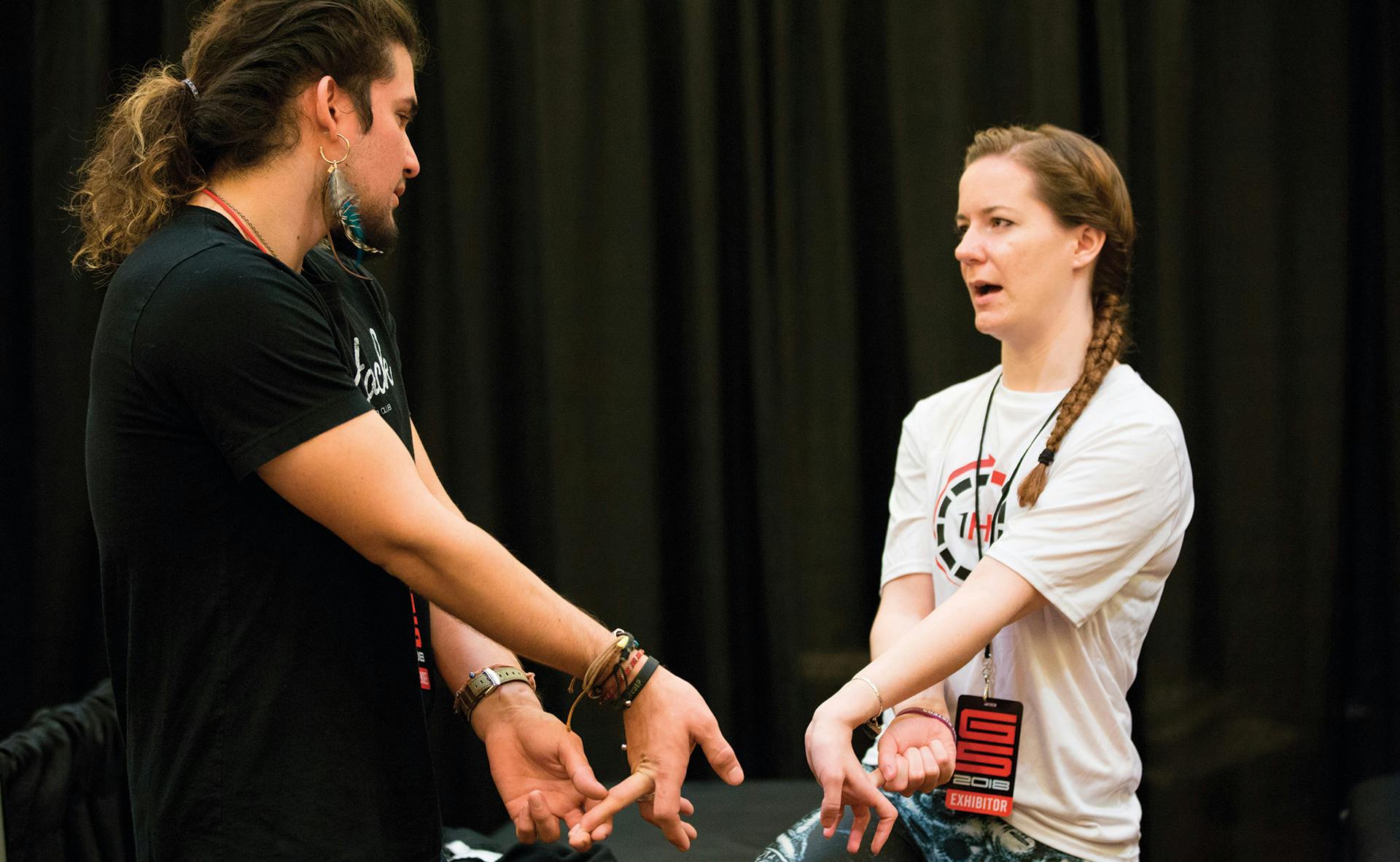The e-sports industry is expected to cross the billion-dollar mark in 2019, boosted by massive expansions worldwide. Deloitte forecast that the e-sports market in North America will increase by 35 percent this year—thanks in large part to a boon in advertising, broadcast rights, and franchise sales. Some of e-sports’ top players are household names among enthusiasts and fans. But like top athletes in any sport, competing at the highest level is a damaging experience.
Which is where Caitlin McGee comes in. McGee is one of just a handful of doctors and physical therapists keeping e-sports’ biggest stars in tip-top condition.
McGee’s route into the wild world of e-sports came as a result of her own play. At the end of her clinical rotations as a physical therapy student, she began to get into gaming. “I was playing a lot and also had several friends who played a lot,” she explains. “They came to me and said, ‘This is hurting, that is hurting. Can you help me with that?’”
Because McGee hadn’t yet finished her studies and attained her doctorate of physical therapy, she couldn’t properly advise them about their specific stresses and strains, but she could give general advice about posture and their gaming setups.
When she graduated in August 2014 with a doctorate in physical therapy from the University of Delaware, McGee started writing articles about the ergonomics in the desks, chairs, and equipment that most gamers use, and how to improve them. It was born from frustration: She’d go to gaming tournaments and see basketball-player-sized competitors folding themselves into gaming seats that were also expected to accommodate 16-year-olds barely five feet tall, whose feet would swing in midair in the same chair. “That’s not going to work for either end of the extreme,” says McGee.
Such badly thought-out gear became a major bugbear and a common theme of McGee’s online posts, and it irked her so much that friends began to get sick of her moaning. “They said stop complaining or do something,” says McGee. “I decided to do something.”
She wrote a comprehensive guide to gaming ergonomics that made waves in the e-sports industry and led to players and managers contacting her with specific questions. Eventually they asked if she could help them with their specific muscle and posture pains. Now she and a colleague, Matthew Hwu, run 1HP, a physical therapy practice targeted at gamers. They consult for teams, wearable tech companies, and run a podcast. They also get flown out to tournaments to offer ad-hoc support for top players during competitions, alleviating aches, pains, and strains. “None of it is what I expected to do with my physical therapy background,” admits McGee.
Gaming-specific physical therapy is still a side hustle for McGee. Since the start of 2015 she has worked at a standard outpatient clinic during the day, specializing in patients with hand, wrist, or posture issues. During the evenings, she sets office hours for her e-sports work, carrying out telehealth and telerehabilitation appointments with players. She also consults for a team in the fighting game community. “It’s not technically full-time for me, but I’m probably putting 30 or so hours a week into e-sports stuff,” she says.
At the tournaments she attends, she sets up drop-in clinics for players trying to alleviate issues in the midst of play. “The first couple of tournaments I worked pro bono,” McGee says. “That’s a bit of a risk because you never want to devalue yourself as a professional, but initially working on tournaments, I knew that they didn’t have budget space for me and had no reason to be invested in what I was doing.”
The initial impact was huge. When the tournaments she attended announced their following year’s dates, players would ask if the physical therapist was going to be there again. “That was a significant gain in trust capital,” she says.
The gaming community works on the basis of word of mouth and support from trusted colleagues. Becoming a part of the world often requires someone to vouch for you.
In part that’s because gaming is a booming space with astronomical growth and the potential to make a quick buck. “Competitive gamers are understandably skeptical,” she says. “There have been a lot of people who have come into the e-sports and gaming spaces and wanted to make money off it. . . . Once it became clear Matt and I had something to contribute and weren’t here to just take, it was a lot easier to get people to consider listening in the first place.”
Physical therapists who have no experience or knowledge of the strains put on the body by competing at the highest gaming levels made it harder for McGee and those who follow her. “I get why gamers were skeptical. They’d spoken to people before, they’d been to medical professionals before, who hadn’t taken into consideration what they did, why they did it, and how they still needed to be able to do it.” Many had been to doctors who advised them to take three weeks off and do nothing. They returned to professional gaming and found that their past injury returned, and perhaps got even worse. The doctors had addressed the fact the patient had a problem, but not the source of the problem itself.
“Yes, of course if you stop hitting your thumb with a hammer it’s going to stop hurting, but it doesn’t address why you’re hitting your thumb with a hammer in the first place,” says McGee. And few professional gamer can afford to take three weeks off and remain on top. “If you’re a streamer who derives their income from streaming as a professional gamer, if you have tournaments you need to be at, this is how you get paid. This is your job. You don’t get work comp for having a wrist injury while you’re gaming.”
McGee’s knowledge of those cold, hard realities—and her ability to help allay worries and correct faults—meant that she quickly gained a reputation in the e-sports world. She’s now a regular on the competitive gaming circuit. “Having someone who was a gamer, who understood not only what they were going through abstractly, but specifically understood you’re having tendon pain on the back of your right hand because you play a certain game and you have a really high APM [the number of actions, meaning mouse clicks or keystrokes, per minute] was really key to getting that investment in my trust capital.”
Only a handful of others do what she does. “A lot of major organizations have at least someone on staff who looks over their health and wellness programming. Some teams have just announced a partnership with a hospital on an e-sports health program. It’s definitely growing, but in terms of the number of people I’ve gotten the chance to work with in this space, there are hardly any,” says McGee.
She hopes that’ll change. “My dream is we get to the point where teams—much in the way the NFL, the NBA, and MLB do—have a medical team that works with them, and that physical therapy is a part of that.” Even in the last three years, she’s seen a major progression in the way e-sports athletes and the teams that support them have thought about their health and wellness. Thinking has shifted from worrying about how to manage an injury once it has happened, to how to prevent an injury from happening in the first place. There’s also a move toward improving lifestyles—beyond the old-fashioned stereotype of gamers chugging cans of Monster Energy drinks in darkened rooms during of all-night play sessions. Professional e-sports players are starting to recognize they need to look more like the athletes they’re compared to. “You’re not required to always be in pain to be at a high level of e-sports—you don’t have to grind so much that your wrists are falling apart in order to be an elite professional gamer.”
Health has become more than a reactive, responsive way to plug problems and alleviate pain. It’s now a proactive, potential performance enhancer—“looking at the way physical and mental wellness improve your ability to play,” says McGee, “ that cause you to play at a higher level. It’s really great to be a part of that.”












